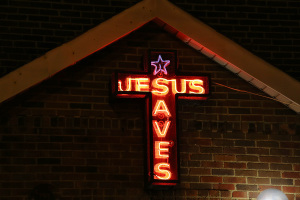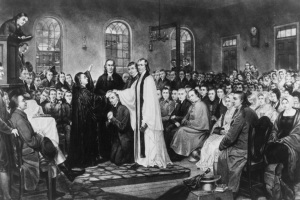Is sorcery a sin? John Piper on what the Bible says about magic, witchcraft

Pastor and theologian John Piper tackled one of Christianity’s enduring debates — how Scripture addresses witchcraft and sorcery — in a recent episode of his “Ask Pastor John” podcast.
The question, posed by a listener named Archie, examined three key biblical texts: Exodus 22:18 and Leviticus 20:27, which prescribe death for sorcerers, and Acts 19:19, where the apostle Paul, encountering a city full of magic practitioners in Ephesus, calls only for their books to be burned.
“Well, this is huge,” Piper said. “I mean, it has to do with the relationships between God’s way of working in Israel in the Old Testament and His way of working today.”
The chancellor of Bethlehem College and Seminary in Minneapolis, Minnesota, began by outlining the historical and theological context of the Old Testament law.
The ancient Israelites functioned as a national and religious entity, with divine laws governing both their worship and civil society. These laws, including capital punishment for certain sins, served a broader purpose.
Listen to John Piper's "Desiring God" podcast on the Edifi Podcast Network
“One of the reasons that God established His presence among the nations through the people of Israel in this way — this particular national way — was to demonstrate the hopeless condition of humanity and to prepare them for the coming of a Savior,” Piper explained.
“The law was given to Israel to show that salvation by law-keeping was impossible because of how deeply sinful humans are.”
From Abraham to Christ, Piper added, God’s primary focus was on Israel as a covenant nation, using its history as a “lesson book” for the world. Severe punishments — including execution for sorcery — were meant to highlight the gravity of sin. “God’s aim for those centuries was to make vivid on Earth the nature of His holiness and the seriousness of sin,” he said.
With the coming of Christ, however, a fundamental shift occurred, the pastor said. No longer was God’s people defined by national identity or territorial boundaries. Instead, Piper emphasized, the Church is now an international body, distinct from the political and legal structures of ancient Israel.
“We are not a nation or a political entity,” he said. “We have no geographic location, and therefore, there is no direct correlation between the laws of the state and the law of Christ in His church.”
“We are transferred out of darkness into the kingdom of Christ (Colossians 1:13). “[Christ’s] kingdom is not of this world” (John 18:36). Otherwise, we would use the sword to enforce his rule, but we don’t.”
This change is why, in Acts 19, Paul did not call for sorcerers to be executed but instead urged the public destruction of their magical texts. Unlike Old Testament Israel, the church operates under a new mandate: to offer forgiveness and call sinners to repentance rather than enforce divine law through civil punishment.
“The sins are just as serious now,” Piper noted. “But we live in a day of mercy, a day of reprieve, a day of salvation and reconciliation with God.”
Piper reinforced that while the Old Testament’s harsh penalties served to highlight sin’s seriousness, the New Testament’s emphasis is on redemption through Christ.
He pointed to 1 Corinthians 6:9–11, where Paul lists sins that previously carried capital punishment under Jewish law but then proclaims, “Such were some of you. But you were washed, you were sanctified, you were justified in the name of the Lord Jesus Christ.”
The implication, according to Piper, is that the Church’s role is not to enforce Old Testament civil penalties but to call sinners to faith.
“The punishment that awaits those whose sins are not repented of and forsaken will be far more severe in Hell than anything the Old Testament ever did through capital punishment,” he warned. “But we are in a time of grace.”
The Don’t Waste Your Life author concluded by stressing that while the standards of holiness remain unchanged, the approach to sin has shifted from immediate judgment to an urgent call for reconciliation through Christ.
“Now is the favorable time; behold, now is the day of salvation,” Piper said, citing 2 Corinthians 6:2. “Be reconciled to God.”
Piper’s comments were part of “witchcraft and wizardry week” on his “Ask Pastor John” podcast. Earlier, he weighed in on whether or not there is “good magic and edifying sorcery” — a debate he “hears all the time over” Lord of the Rings and Harry Potter and other fantasy literature.
The pastor said he believes it comes down to “whether the creation of an alternative world in fiction can effectively communicate [the] truth about the real world and draw people into it.”
“Can made-up reality clarify reality? Does fiction have the capacity to awaken people to the truth of the real world? And I think the answer to that question is, ‘some of it,’” Piper said.
Piper explained that he had been “exposed to fiction that is simply corrupting” on a spiritual level, but has also experienced fiction “that makes me love purity, nobility, courage, sacrifice, love, hope, joy.”
A 2018 study found that the population of self-identified witches has risen dramatically in the United States in recent decades, as interest in astrology and witchcraft practices has become increasingly mainstream.
The study found that witchcraft, which includes Wicca, paganism, folk magic and other New Age traditions, is one of the fastest-growing spiritual paths in the country.
At Passion 2023, an annual event geared toward young people, author and speaker Jackie Hill Perry warned that too many churches are giving Satan room to “destroy,” leading a generation of Christians to be more comfortable engaging with elements of “witchcraft” rather than engaging with the true power of the Holy Spirit.
“The enemy is trying to destroy an entire generation of Christians with witchcraft. He wants us to consider alternative sources of power for joy, for peace [and] for a right mind,” Perry warned.
“I think some of the blame for that is the Church because we have been raised in churches that are more afraid of the Holy Spirit than they are of Harry Potter.”





























